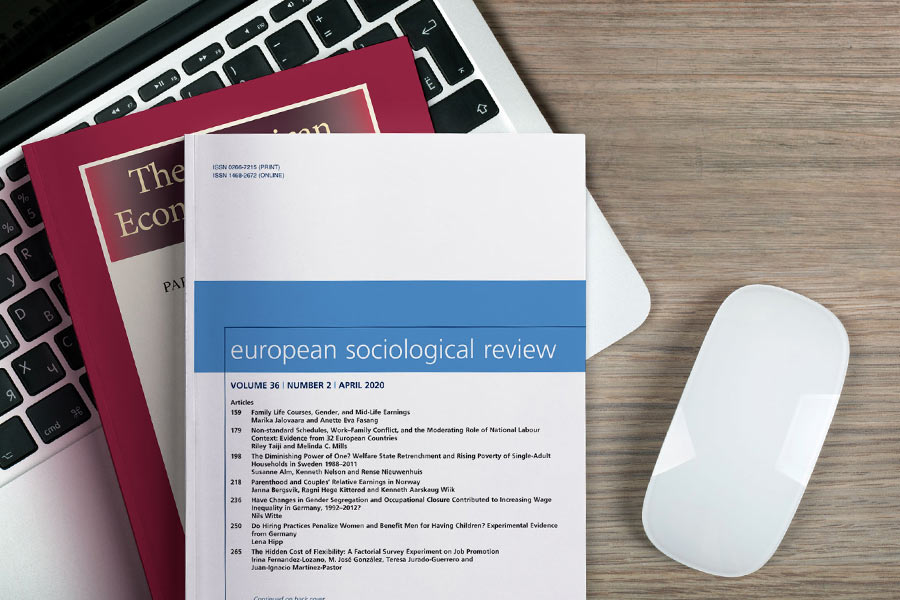Total hits 17.297
-
Die Modellierung adjustierter Suchdauern als Indikator für die Fachkräftesituation im Beruf
Maier, T., Steeg, S. & Zika, G. (2020): Die Modellierung adjustierter Suchdauern als Indikator für die Fachkräftesituation im Beruf. Version 1.0. Bonn, 49 p.
-
Erst kam die Flucht, dann Corona - oder: Welche Folgen werden die Corona-Bekämpfungsmaßnahmen für das Leben und Netzwerken von Geflüchteten in Deutschland haben?
Bernhard, S. (2020): Erst kam die Flucht, dann Corona - oder: Welche Folgen werden die Corona-Bekämpfungsmaßnahmen für das Leben und Netzwerken von Geflüchteten in Deutschland haben? In: C. Stegbauer & I. Clemens (Hrsg.) (2020): Corona-Netzwerke - Gesellschaft im Zeichen des Virus, Wiesbaden, p. 187-195. DOI:10.1007/978-3-658-31394-4_18
-
Arbeitsmarktnetzwerk in der Krise?
Kropp, P. (2020): Arbeitsmarktnetzwerk in der Krise? Überlegungen zu den Auswirkungen der Corona-Pandemie. In: C. Stegbauer & I. Clemens (Hrsg.) (2020): Corona-Netzwerke - Gesellschaft im Zeichen des Virus, Wiesbaden, p. 117-126. DOI:10.1007/978-3-658-31394-4_12
-
Institute for Employment Research, Germany: Access to Administrative Labor Market Data for International Researchers
Müller, D. & Vom Berge, P. (2020): Institute for Employment Research, Germany: Access to Administrative Labor Market Data for International Researchers. In: S. Cole, I. Dhaliwal, A. Sautmann & L. Vilhuber (eds.) (2020): Handbook on Using Administrative Data for Research and Evidence-based Policy, getr. Sz.
-
Adjusting to globalization in Germany
Dauth, W., Findeisen, S. & Südekum, J. (2021): Adjusting to globalization in Germany. In: Journal of labor economics, Vol. 39, No. 1, p. 263-302. DOI:10.1086/707356
-
Nurse Effects on Non-Response in Survey-Based Biomeasures
Cernat, A., Sakshaug, J., Chandola, T., Nazroo, J. & Shlomo, N. (2021): Nurse Effects on Non-Response in Survey-Based Biomeasures. In: International Journal of Social Research Methodology, Vol. 24, No. 4, p. 487-499. DOI:10.1080/13645579.2020.1832737
-
Robot Adoption at German Plants
Deng, L., Plümpe, V. & Stegmaier, J. (2020): Robot Adoption at German Plants. (IWH-Diskussionspapiere 2020,19), Halle, 28 p.
-
Evaluation des Bundesprogramms „Soziale Teilhabe am Arbeitsmarkt“
Ivanov, B., Pfeiffer, F. & Pohlan, L. (2020): Evaluation des Bundesprogramms „Soziale Teilhabe am Arbeitsmarkt“. Fünfter Bericht – Wirkungen nach Programmende. (Bundesministerium für Arbeit und Soziales. Forschungsbericht 551), Duisburg, 112 p.
-
Bernd Fitzenberger über aktuelle und künftige Herausforderungen für die Arbeitsmarktpolitik und seinen Start als IAB-Direktor (Interview)
Kargus, A. & Schludi, M.; Fitzenberger, B. (interviewed person) (2020): Bernd Fitzenberger über aktuelle und künftige Herausforderungen für die Arbeitsmarktpolitik und seinen Start als IAB-Direktor (Interview). In: IAB-Forum No. 13.10.2020 Nürnberg, o. Sz.
-
The IAB Job Vacancy Survey: design and research potential
Bossler, M., Gürtzgen, N., Kubis, A., Küfner, B. & Lochner, B. (2020): The IAB Job Vacancy Survey: design and research potential. In: Journal for labour market research, Vol. 54, No. 1. DOI:10.1186/s12651-020-00278-6
-
Die Bedeutung des Handwerks in Baden-Württemberg - Fokus: Fachkräfte in Handwerksberufen
Faißt, C., Hamann, S. & Jahn, D. (2020): Die Bedeutung des Handwerks in Baden-Württemberg - Fokus: Fachkräfte in Handwerksberufen. (IAB-Regional. Berichte und Analysen aus dem Regionalen Forschungsnetz. IAB Baden-Württemberg 01/2020), 51 p.
-
Kinderbetreuung in der Corona-Krise: Wer betreut, wenn Schulen und Kitas schließen?
Zoch, G., Bächmann, A. & Vicari, B. (2020): Kinderbetreuung in der Corona-Krise: Wer betreut, wenn Schulen und Kitas schließen? (NEPS Corona & Bildung 03), Bamberg, 9 p.
-
History dependence in wages and cyclical selection: evidence from Germany
Bauer, A. & Lochner, B. (2020): History dependence in wages and cyclical selection: evidence from Germany. In: Labour Economics, Vol. 67. DOI:10.1016/j.labeco.2020.101932
-
Are skewed sex ratios associated with violent crime?
Filser, A., Barclay, K., Beckley, A., Uggla, C. & Schnettler, S. (2021): Are skewed sex ratios associated with violent crime? A longitudinal analysis using Swedish register data. In: Evolution and Human Behavior, Vol. 42, No. 3, p. 212-222. DOI:10.1016/j.evolhumbehav.2020.10.001
-
Employment effects of payroll tax subsidies
Collischon, M., Cygan-Rehm, K. & Riphahn, R. (2021): Employment effects of payroll tax subsidies. In: Small business economics, Vol. 57, p. 1201–1219. DOI:10.1007/s11187-020-00344-w
-
How effective are enforcement measures for compliance with the minimum wage?
Bossler, M., Jaenichen, U. & Schächtele, S. (2022): How effective are enforcement measures for compliance with the minimum wage? Evidence from Germany. In: Economic and Industrial Democracy, Vol. 43, No. 2, p. 943-971. DOI:10.1177/0143831X20962193
-
Labour Market Forecasts 2020/2021: Regional labour markets expected to recover differently from the corona crisis
Rossen, A., Roth, D., Wapler, R. & Weyh, A. (2020): Regionale Arbeitsmarktprognosen 2020/2021: Der Arbeitsmarkt erholt sich von der Corona-Krise regional sehr unterschiedlich. (IAB-Kurzbericht 20/2020), Nürnberg, 8 p.
-
Regional Labour Market Forecasts
Rossen, A., Roth, D., Wapler, R. & Weyh, A. (2020): Regional Labour Market Forecasts. Current Data and Indicators. (Institut für Arbeitsmarkt- und Berufsforschung. Aktuelle Daten und Indikatoren 01/2020 (en)), Nürnberg, 21 p.
-
Regionale Arbeitsmarktprognosen
Rossen, A., Roth, D., Wapler, R. & Weyh, A. (2020): Regionale Arbeitsmarktprognosen. (Institut für Arbeitsmarkt- und Berufsforschung. Aktuelle Daten und Indikatoren 01/2020 (de)), Nürnberg, 21 p.
-
Steigert sinnstiftende Arbeit die Bereitschaft zum Lohnverzicht?
Kesternich, I., Schumacher, H., Schwarz, S. & Siflinger, B. (2020): Steigert sinnstiftende Arbeit die Bereitschaft zum Lohnverzicht? In: IAB-Forum No. 08.10.2020 Nürnberg, o. Sz.



